Spiritual Growth Practices: A Journey of Self-Discovery

Spiritual growth practices offer a path to personal transformation, leading us to a deeper understanding of ourselves and our place in the world. This journey is not about adhering to a specific belief system but rather about exploring the inner landscape of our being and cultivating a sense of connection with something greater than ourselves.
Whether meditation, prayer, or simply spending time in nature, these practices provide tools for cultivating inner peace, developing self-awareness, and embracing compassion.
From fostering mindfulness to cultivating gratitude, forgiveness, and self-compassion, these practices equip us to navigate life’s challenges with greater resilience and wisdom. As we delve deeper into our spiritual growth, we begin to understand the interconnectedness of all things, allowing us to connect with the divine or a higher power in a meaningful way.
This journey is not a destination but a continuous process of self-discovery, unfolding with each step we take.
Understanding Spiritual Growth: Spiritual Growth Practices
Spiritual growth is a journey of self-discovery and transformation, a process of expanding our awareness and connecting with something greater than ourselves. It’s about cultivating inner peace, compassion, and wisdom, leading to a more fulfilling and meaningful life.
The Importance of Self-Reflection
Self-reflection plays a crucial role in spiritual growth. It allows us to examine our thoughts, beliefs, and actions, identifying areas where we can grow and evolve. By looking inward, we gain insights into our motivations, patterns, and limiting beliefs, paving the way for positive change.
- Journaling: Regularly writing down our thoughts and feelings can provide valuable insights into our inner world. It allows us to process emotions, identify recurring patterns, and better understand ourselves.
- Meditation: Meditation helps us quiet the mind, observe our thoughts without judgment, and connect with our inner wisdom. It cultivates mindfulness and allows us to develop a more compassionate and accepting perspective.
- Mindfulness Practices: Paying attention to the present moment without judgment, whether through mindful breathing, walking, or eating, helps us cultivate awareness and appreciate the beauty of life.
Spiritual Growth in Everyday Life
Spiritual growth is not confined to specific practices or rituals. It manifests in our everyday interactions and choices.
- Compassion and Kindness: Showing empathy and kindness to others, even in challenging situations, reflects our growing compassion and understanding of interconnectedness.
- Forgiveness: Letting go of resentment and anger towards ourselves and others allows us to release negative energy and create space for healing and growth.
- Gratitude: Cultivating gratitude for the good things in our lives, no matter how small, shifts our focus towards positivity and appreciation.
- Acceptance: Accepting ourselves and others unconditionally, and embracing our imperfections and differences, fosters inner peace and understanding.
Practices for Cultivating Inner Peace
Inner peace is a state of mental and emotional calmness, a sense of tranquility and harmony within oneself. It is a state of being free from stress, anxiety, and worry. Cultivating inner peace is a journey that requires consistent effort and dedication, but the rewards are immeasurable.
Mindfulness Meditation
Mindfulness meditation is a practice that involves focusing your attention on the present moment without judgment. It is a powerful tool for cultivating inner peace by reducing stress, improving focus, and fostering self-awareness. Here is a step-by-step guide for beginners:
- Find a Quiet Space: Choose a comfortable and quiet place where you won’t be disturbed.
- Choose a Comfortable Position: Sit upright on a chair or cushion, or lie down if you prefer. Ensure your body is relaxed and supported.
- Focus on Your Breath: Pay attention to the natural rhythm of your breath as it enters and leaves your body. Observe the sensations of your breath without trying to change it.
- Observe Your Thoughts and Feelings: As thoughts and feelings arise, acknowledge them without judgment. Simply observe them as they pass through your mind like clouds in the sky.
- Return to Your Breath: If your mind wanders, gently guide it back to your breath. Don’t get discouraged if your mind wanders; it’s natural.
- Start Small: Begin with just 5-10 minutes of meditation each day and gradually increase the duration as you become more comfortable.
Practicing Gratitude
Gratitude is the act of appreciating and acknowledging the good things in your life. Cultivating gratitude can significantly enhance your spiritual well-being by shifting your focus from negativity to positivity. Here are some techniques for practicing gratitude:
- Keep a Gratitude Journal: Write down three things you are grateful for each day. This practice helps you consciously focus on the positive aspects of your life.
- Express Gratitude to Others: Take the time to express your appreciation to people who have made a positive impact on your life. This could be through a simple thank-you note, a heartfelt conversation, or a small act of kindness.
- Practice Gratitude Meditations: There are various guided meditations available that focus on cultivating gratitude. These meditations can help you deepen your appreciation for the good things in your life.
Forgiveness
Forgiveness is the act of releasing resentment and anger towards yourself or others. It is a powerful tool for achieving inner peace because it frees you from the emotional burden of holding onto past hurts. Here are some practical tips for letting go of resentment:
- Understand the Benefits of Forgiveness: Forgiveness is not about condoning the actions of others; it is about releasing yourself from the pain and negativity associated with those actions.
- Practice Compassion: Try to understand the perspective of the person who hurt you. Remember that everyone makes mistakes, and we all have our struggles.
- Write a Forgiveness Letter: Write a letter to the person you need to forgive, expressing your feelings and letting go of your resentment. You don’t have to send the letter; the act of writing it can be therapeutic.
- Seek Professional Help: If you are struggling to forgive, consider seeking guidance from a therapist or counselor. They can provide support and tools to help you work through your feelings.
Developing Self-Awareness and Compassion

Self-awareness and compassion are fundamental pillars of spiritual growth. They empower us to understand ourselves better, cultivate empathy, and build meaningful relationships. By exploring our inner landscape and fostering a sense of kindness towards ourselves and others, we can embark on a transformative journey of personal development.
Shadow Work, Spiritual growth practices
Shadow work is a crucial aspect of self-awareness, involving confronting and integrating the darker, less acceptable parts of ourselves. These aspects often include suppressed emotions, negative beliefs, and unconscious patterns that can hinder our growth and well-being. Engaging in shadow work requires courage and introspection, but it ultimately leads to greater self-acceptance and wholeness.
“The shadow is a more vital part of the personality than the ego. It is the dark side of the personality, the side that we deny or repress.”
Carl Jung
Self-Compassion
Self-compassion is the ability to treat ourselves with kindness, understanding, and acceptance, especially during difficult times. It involves recognizing our limitations and imperfections without judgment and offering ourselves the same empathy and support we would extend to a loved one.
Cultivating Self-Compassion
- Practice mindfulness: Paying attention to our thoughts and feelings without judgment can help us identify and challenge negative self-talk.
- Engage in self-soothing activities: Activities like taking a warm bath, listening to calming music, or spending time in nature can provide comfort and support.
- Challenge self-criticism: When we experience negative thoughts, ask ourselves if we would speak to a friend in such a harsh manner.
Self-Awareness and Empathy
Self-awareness is the foundation of empathy. When we understand our own emotions and motivations, we are better equipped to recognize and relate to the feelings of others. This connection fosters deeper understanding and compassion, leading to more meaningful and authentic relationships.
“Empathy is the ability to understand and share the feelings of another.”
Merriam-Webster Dictionary
Connecting with the Divine or a Higher Power

Connecting with a divine force or a higher power is a fundamental aspect of spiritual growth for many individuals. This connection can provide a sense of purpose, guidance, and solace in life’s journey. While the specific nature of this connection varies greatly across different spiritual traditions, the underlying principle remains the same: seeking a deeper understanding of the universe and one’s place within it.
Prayer
Prayer is a common and powerful way to connect with the divine. It involves communicating with a higher power through spoken or unspoken words, thoughts, or feelings. Prayer can be a form of supplication, expressing needs and desires, or it can be a way of expressing gratitude, praise, or seeking guidance.
- Formal Prayer: Many religions have established forms of prayer, often with specific words and rituals. For example, in Christianity, the Lord’s Prayer is widely used and cherished.
- Informal Prayer: Informal prayer can take many forms, such as simply talking to God, meditating on a particular passage from scripture, or offering silent prayers throughout the day.
Contemplation
Contemplation is a form of deep, focused meditation that involves quieting the mind and opening oneself to spiritual insights. It is a practice of introspection and reflection, allowing individuals to connect with their inner selves and experience a deeper connection with the divine.
- Mindfulness Meditation: This type of meditation involves paying attention to the present moment without judgment. It can help to quiet the mind and cultivate a sense of peace and stillness.
- Transcendental Meditation: This technique involves repeating a mantra or sound to quiet the mind and access a state of deep relaxation.
Nature Immersion
Nature immersion is a powerful way to connect with the divine through the beauty and awe-inspiring power of the natural world. Spending time in nature can evoke a sense of wonder, gratitude, and reverence for the interconnectedness of all things.
- Walking in the Woods: A simple walk in the woods can be a profound experience, allowing you to connect with the natural world and feel a sense of peace and serenity.
- Sitting by a Body of Water: The sound of water flowing or crashing against the shore can be incredibly calming and meditative.
Intuition
Intuition is a form of inner guidance that can be described as a gut feeling, a sudden insight, or a sense of knowing without conscious reasoning. While it is often difficult to define, intuition can play a significant role in spiritual growth by providing guidance, inspiration, and clarity.
- Paying Attention to Your Inner Voice: Take time to listen to your inner voice, which may offer subtle cues, whispers, or even loud and clear messages.
- Trusting Your Instincts: When faced with a decision, trust your gut feeling. If something feels off, it might be a sign to reconsider your course of action.
Rituals and Ceremonies
Rituals and ceremonies are symbolic actions that can deepen spiritual practices and enhance the connection with the divine. They provide structure and meaning to spiritual experiences, creating a sense of sacredness and connection.
- Religious Rituals: Many religions have established rituals and ceremonies, such as prayer, sacraments, and festivals, that are designed to connect individuals with their faith.
- Personal Rituals: Individuals can create their rituals, such as lighting a candle, meditating in a specific space, or engaging in a particular activity that fosters a sense of connection with the divine.
Embracing Spiritual Growth as a Lifelong Journey

Spiritual growth is not a destination but an ongoing journey, a continuous process of self-discovery and transformation. It’s about evolving our consciousness, expanding our understanding of ourselves and the world around us, and cultivating a deeper connection to something greater than ourselves.
This journey can be challenging, and filled with moments of doubt, uncertainty, and even setbacks. But it is also incredibly rewarding, offering a sense of purpose, peace, and fulfillment that enriches every aspect of our lives.
Inspirational Stories of Spiritual Transformation
Many individuals have undergone significant spiritual transformations, finding renewed purpose and meaning in their lives. These transformations can be gradual or sudden, but they all involve a shift in perspective, a deeper understanding of oneself, and a greater connection to something beyond the material world.
- The story of the Buddha, Siddhartha Gautama, who renounced his privileged life to seek enlightenment, is a classic example of spiritual transformation. After years of searching, he achieved enlightenment and became known as the Buddha, the “Awakened One.” His teachings on the Four Noble Truths and the Eightfold Path continue to inspire millions of people around the world.
- Mother Teresa, a Catholic nun, dedicated her life to serving the poorest of the poor. Her unwavering compassion and commitment to helping others inspired countless individuals to embrace a life of service and love.
- Nelson Mandela, a South African anti-apartheid revolutionary, spent 27 years in prison for his beliefs. Despite the hardships he endured, Mandela remained committed to his ideals and emerged from prison as a symbol of hope and forgiveness. He went on to become the first black president of South Africa, leading the country towards a more just and equitable future.
Challenges and Rewards of Maintaining a Spiritual Practice
Maintaining a spiritual practice over time can be challenging. Life’s demands, distractions, and setbacks can make it difficult to stay committed to our spiritual goals. However, the rewards of a consistent spiritual practice are immeasurable.
- Challenges:
- Time constraints: Balancing work, family, and other responsibilities can make it difficult to find time for spiritual practices.
- Distractions: The constant bombardment of information and stimuli in the modern world can make it difficult to focus on our inner world.
- Doubt and uncertainty: Spiritual growth often involves facing our fears, confronting our limitations, and questioning our beliefs. This process can be uncomfortable and lead to feelings of doubt and uncertainty.
- Setbacks: We all experience setbacks on our spiritual journey. These can be disheartening, but they are also opportunities for growth and learning.
- Rewards:
- Increased self-awareness: Spiritual practices help us become more aware of our thoughts, feelings, and motivations.
- Inner peace: By cultivating a sense of inner peace, we can navigate the challenges of life with greater resilience and equanimity.
- Greater compassion: Spiritual growth often leads to a greater understanding of ourselves and others, fostering compassion and empathy.
- Sense of purpose: Spiritual practices can help us connect with a deeper sense of meaning and purpose in life.
- Resilience: Spiritual practices can help us develop greater resilience in the face of adversity.
Staying Motivated and Finding Joy in the Journey
Staying motivated on a lifelong spiritual journey requires dedication, discipline, and a willingness to embrace the process. Here are some tips for finding joy and staying motivated:
- Find a practice that resonates with you: There are many different spiritual practices, from meditation and yoga to prayer and service. Explore different options and find one that resonates with your values and interests.
- Set realistic goals: Start with small, achievable goals and gradually increase the intensity or duration of your practice. Don’t be afraid to adjust your goals as you progress.
- Be patient and compassionate with yourself: Spiritual growth takes time and effort. Be patient with yourself and celebrate your progress, even if it’s small.
- Find a spiritual community: Connecting with others who are on a similar journey can provide support, encouragement, and inspiration.
- Focus on the benefits: Remember the rewards of spiritual practice, such as increased self-awareness, inner peace, and a greater sense of purpose.
- Embrace the journey: Spiritual growth is not a destination but a process. Embrace the challenges and joys of the journey, knowing that you are constantly evolving and growing.
“The journey of a thousand miles begins with a single step.”Lao Tzu
Epilogue

Ultimately, the pursuit of spiritual growth is a lifelong journey of self-discovery and transformation. It’s about embracing the challenges and rewards that come with cultivating a deeper understanding of ourselves and our place in the universe. Through consistent practice and a willingness to explore our inner landscape, we can cultivate a sense of peace, purpose, and connection that enriches our lives and empowers us to live with greater intention and compassion.
Comments are closed.